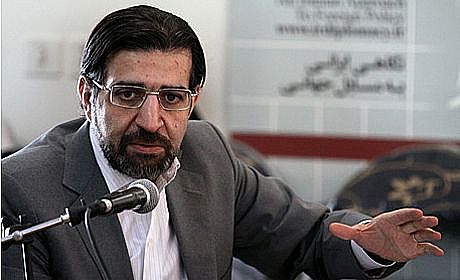On Monday, we noted that Fars News, linked to the Revolutionary Guards, had launched an all-out propaganda offensive against Saudi Arabia because of Riyadh’s support for the Syrian insurgency. Headlines included “Saudi Envoy Meets Zionist Lobby Officials in Geneva”, “Saudi Intelligence Chief Prince Bandar Insults Qataris in Meeting on Syria“, and “S. Arabia Undertakes to Fund, Supply Fuel for Syria Aggressors“.
This was far from an unexpected development. The Revolutionary Guards are strident in their support for the Syrian regime, and Fars is not known for either subtlety or accuracy.
But what are we to think when one of Iran’s leading political analysts — a former high-ranking diplomat and editor of the website Iranian Diplomacy — mimics Fars and conspiracy theorists?
Last weekend, Sadegh Kharrazi (pictured), who was Iran’s Ambassador to France and the United Nations, wrote a column in the newspaper Ettalaat, “Chemical Catostrophe in Damascus“. The headline gave no clue where Kharrazi was headed, however:
The radical Arab groups [in Syria] such as Al-Qaeda, Al-Nusra Front and other Salafi militia forces that are under the command of the Saudi Prince Bandar bin Sultan, have….chosen a dangerous path….
The mass murder of the Syrian people by forces that are supported by the Saudi Bandar bin Sultan and other security establishments of the region, has created a sudden bloody atmosphere within the international community. As a result of that atmosphere, a huge global propaganda campaign has been launched against the government of Syria. Meanwhile, the US State Department along with the United States National Security Council and the White House are apparently falling prey to the apparent influence of Bandar.
Later, as part of his explanation of why insurgents are responsible for the chemical weapons attacks of August 21, Kharrazi writes:
[A] new militia force, whose members included up to 25,000 voluntary militants, entered Syria secretly under the cover that had been provided to them by Saudi Arabia’s intelligence and secret services led by Bandar bin Sultan.
The chemical attack on the suburbs of Damascus took place only a few days after the failure of secret talks between Bandar and Putin in Moscow and Bandar’s threat that a catastrophic incident was expected in the region.
And the conspiracy is not just about Syria:
The new plan drawn up by Bandar and the secret service of Saudi Arabia aims to create a so-called “Sunni Hezbollah” as counterbalance to the Lebanese Hezbollah movement. The main goal of a meeting that Bandar held with [Lebanese political figures] Samir Geagea, Walid Jumblatt, and Saad Hariri was to form military resistance forces against the Lebanese Hezbollah.
All the claims raise a smile. But do they have any serious significance?
Yes.
Kharrazi is not known as a “hard-liner” bent on confrontation with the “West”. To the contrary, he has been seen as a member of the camp advocating engagement with the US and other countries: in 2003, he had a leading role in an attempt by Tehran at reconciliation with Washington, through a letter sent via the Swiss Government.
Kharrazi has also been identified with the backers of Hassan Rouhani, whose ascent to the Presidency promised not only engagement but also a step away from the bombastic rhetoric of former President Ahmadinejad.
And now Rouhani and his inner circle, including former President Hashemi Rafsanjani, are in a battle with other elements of the regime over the line on Syria following the use of chemical weapons. The President is trying to maintain a stance which does not cast blame for the attacks and does not focus on the US-Saudi-Israeli axis as the explanation for Middle Eastern developments.
So has Kharrazi, through his dramatic editorial, turned against his President and embraced the “hard-line” camp? Or is he writing on direction from others? If so, whom?

